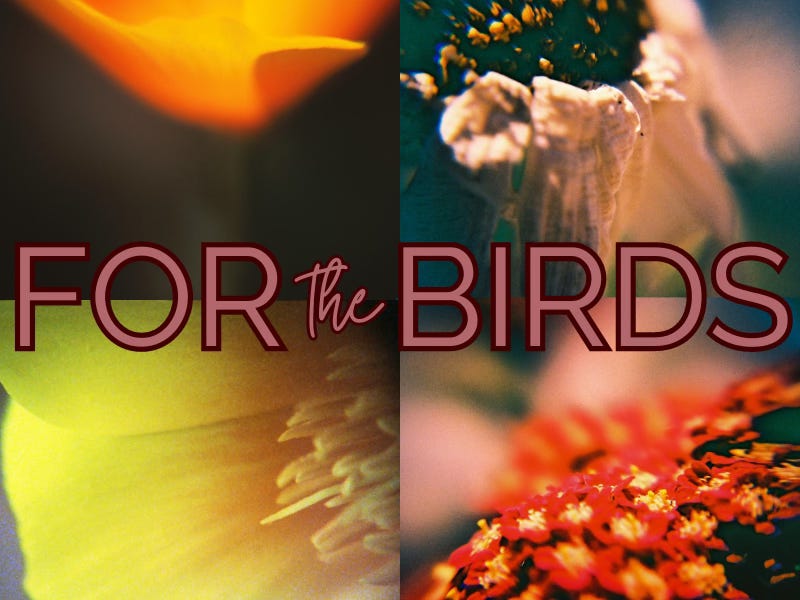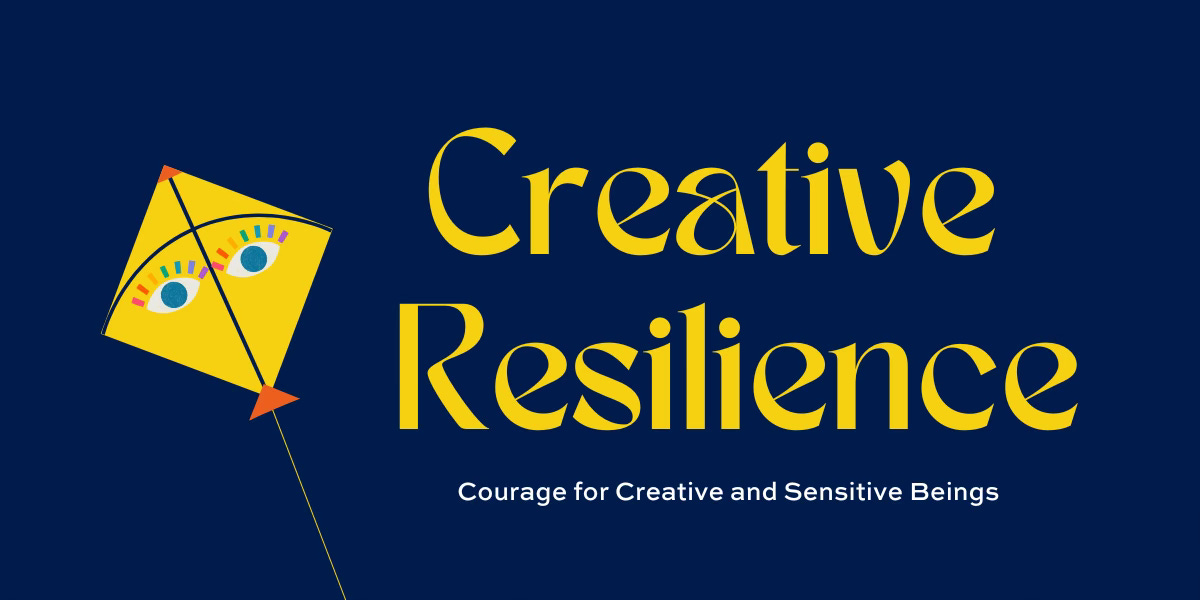For the Birds: Are you a sun writer, or a moon writer?
Divergent pacing, authentic assessment, and the gift of friends who make you feel nOrMaL. Plus some cosmic questions for drumming up clarity.
Happy new moon, friends! I’m on a mission to serve others through writing & mentorship, and I’m doing this work as a self-employed, neurodivergent human. Your support has a bigger impact on my life than you likely know. Please know it! When you can, thank you for reading closely, sharing widely, and upgrading to a paid subscription.
My new friend,
, writes the brilliant publication, .YEP: You know that phrase I’m always yammering on about and naming my virtual gatherings after? There’s a human living on the other side of the world—who may or may not be my emotional doppelgänger—and who spends her days advocating for the same combo of goodnesses that I do.
When Raju and I first met back in April, our casual coffee date turned into a two-hour collaborative TED Talk. (We were a small but very engaged audience of two.) This is my favorite way to be with people!! To go deep and sensitive and slightly weird—and fast.
Another way to describe it is that it isn’t fast or weird at all, just the pace of two neurodivergent people being unmasked and real with each other; kind of like how I’m not being slow when it takes me days or weeks to finish a thought or catch up with my reaction to something; I’m simply taking the time it takes me. Divergent pacing is real. It tends to be slower, more seasonal. It’s thorough, but not efficient.1 And it relies on measurements reflected in the natural world, not the status quo, manufactured, capitalistic one.
The mutual gift of witnessing and reciprocity means everything to me, and there is nothing quite so magical as entering that space with a new person and finding sudden kinship, a kinship that feels like it should have taken years to build.
Some people (perhaps more neurotypical ones) might wonder at our strange “hurried” pacing, or be confused by our desire to skip the small talk and go straight to vulnerable places, or feel put off by the amount of tenderness some of us so immediately display.
But these are the rooms and relationships I want to be in, as a coach / mentor, and as a writer / poet, and as a highly sensitive Autistic person looking to normalize what, after all, feels very normal to me.
How normal all this strange sensitivity really is.
What kinds of normal are you made normal by? The question is both therapeutic and poetic, and I ask it with a lightness and a sense of reclamation in my chest.
“The day is not the right unit for us”
Those are Raju’s brilliant words, shared in response to our mutual thoughts about the seasonality of writing, and the way so many of us—especially womxn—learn to measure our output with the wrong tools.2
She explained it to me like this: At the end of her day, her list of accomplishments more often than not feels very small. But at the end of the month? Suddenly the rich abundance of everything that’s transpired over the last four or so weeks is made clear. The day is the wrong measurement, she proclaimed! Which means that measuring her efforts according to such will only bring feelings of failure and self-alienation.
Shifting her timeframe to something more personally accurate is a brilliant example of a process that I think really good internal work is fueled by, work that in turn fuels all the external, earth-bound stuff (habits, goals, and our real experiences of making and writing). First, we get clear on our values. This part is vital, but there’s another step. If we stop here, most of us will keep measuring our experiences with tools that were not made with those values in mind.
The next step is letting our values influence our assessments. Raju needed to figure out what she values—seasonality, for example—AND THEN she needed to come up with a way to measure her work accordingly; in this case, not by the day, but by the month.
A slower, more patient, more luscious inventory of oneself. In other words: authentic.
The effectiveness of authenticity
As another example, take this brilliant revelation from past Wayfinding client, Resiliency Circle attendee, and creative friend of mine, Christie:
“It’s easy for me to say, ‘I do not measure success by the size of my house or the clothes I wear. I measure it by the ability I have to engage in adventures that excite me, time with my family, having freedom and options.’
However, even though I can say that, I still hold onto some beliefs and/or feelings of inadequacies because my house is tiny and cluttered, my clothes often feel sloppy, and I don't have any kind of fashion sense! So despite holding my own definitions of success, and values that aren't always in line with the capitalist status quo, I still look at the effectiveness of my work, my leisure activities, and my social interactions through a lens defined by societal views. Which gives me some feelings of not enoughness that actually does not align with my OWN values.
Christie goes on to ask a question that I have not been able to get out of my head since reading it: “How can I truly believe in my definitions of what’s important, what’s worthy, [and] what’s success, if I measure the effectiveness of my behaviors by standards I don’t even believe in?”
[Dear readers: I did consider ending my newsletter here, a literary mic drop on Christie’s behalf]
Christie and I were talking about effectiveness thanks to this amazing post by
, but Christie’s revelations are entirely her own.Thanks to people like Raju and Christie and Tara, here’s where my brain is at this morning:
We need the values, and we need the authentic definitions and beliefs.
We also need the lenses—those tools we use to witness and measure ourselves—that will let us see such good things in authentic lighting.
Night vision goggles won’t do anything if you’re only putting them on during the day.
Sun writing & moon writing (some exercises)
Speaking of night and day, the point here isn’t to make your creative values and lenses look exactly like mine, or Raju’s, or Christie’s. The point is to invite curiosity to those things that might feel normal or objective, but which aren’t necessarily making space for the authentic fullness of your creativity.
To play with this idea a little further, here’s a list of questions & qualities to help you start thinking about the kind of creative person you are, and the kinds of lenses you might require. To be clear: “sun” and “moon” are the frameworks Raju and I landed on, but you can go in any direction with this. You might even see things you relate to in both lists! I’m less concerned about whether or not the frameworks below are objectively true, and more concerned about prompting a new way of thinking about time and effort. Whatever your framework ends up looking like, my invitation is this: To spend some time thinking creatively about your creativity.
If you are a sun writer
You thrive on consistency and aim for a daily routine
You generally benefit from short, frequent bursts of creativity
You need a lot of brightness, buoyancy, and hope
You work well with to-do lists
You also work really well with “to-did” lists, and taking stock of your accomplishments at the end of the day
Your creative trajectory can change frequently, but tends to orbit certain overarching themes
If you are a moon writer
You thrive on allowing your creativity to ebb and flow
You tend to benefit from long, highly focused sessions and luxurious breaks
You need space for expressing darkness, and for serious, complex thinking
You like to follow rabbit holes & spontaneous inspirations
You really benefit from taking an overview of your creativity in larger phases or spans of time—and setting goals & aims that way, too
Your creative trajectory follows the same broader cycles, but within them, a whole world of diverse details & interest are held
Questions to ask yourself
for drumming up self-knowing
Note: The following questions are written *as if* your answers will be binary. They might not be! That’s okay. Exploring what comes up—and why—will still bring clarity.
What sounds better: Making contact with your creativity often, or having one day a week to get lost in your creative flow?
Do you turn to your creativity to express what you already know, or discover what you don’t? Is it a purging, or an accumulation?
Do lists make you feel supported & clear, or restricted?
When you think about the recurring themes of your writing & creativity, does this strike you as boring and bad-repetitive, or devoted and good-repetitive?
Come up with your own question and share it with Raju and I in the comments!
I’m starting to think “efficiency” is one of my anti-values.









Sarah, our first meeting was at once empowering and tranquil, poetic and practical, unnaturally good and naturally amazing. Praying that not only is this just the beginning of a deep and delightful connection, but that such synchronicities never elude us, that we always find kindred spirits, across apps and oceans. Here's to getting your mind blown by strangers, to friendship at first sight. 🥂💞 Thank you for writing this and pairing it with your brilliant, cosmic prompts.
Dear Sarah, I loved this post. However, I was resonating with a lot of the Moon and some of the Sun, so I would sugggest a third person - the Star Person 😁. I love making lists, and while the items will get carried forward for months at times, lists give me a sense of control. However, in most other ways I am a Moon person. Thank you for sharing this lovely discussion Raju and you had. I am going to think deeply about this.